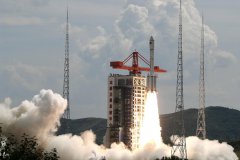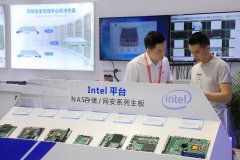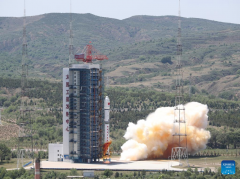Home>>
Raring to navigate pivotal phase of reformBy Ma Si (China Daily) 13:43, August 12, 2024

Two visitors try out an AI-enabled education program at a high-tech company in Fuzhou, Fujian province. (Photo/Xinhua)
China's sharpened focus on advancing technological innovation and fostering new quality productive forces has come in for big praise from Chinese and foreign entrepreneurs as well as industry experts, encouraging them to double down on research and development for technological breakthroughs and to pursue new opportunities arising from the country's industrial upgrade.
The mounting enthusiasm came after the third plenary session of the 20th Central Committee of the Communist Party of China, a crucial meeting that adopted a resolution on further deepening reforms comprehensively to advance Chinese modernization.
The resolution detailed a set of meticulously crafted reform plans, and called for improving existing institutions and mechanisms to foster new quality productive forces, in line with local conditions.
Zhang Li, director of the China Center for Information Industry Development, a Beijing-based think tank, highlighted the significance of institutional and mechanism innovation, describing it as a key characteristic to nurture new quality productive forces.
"The resolution signals a strengthening of institutional support for developing new quality productive forces, aimed at enhancing the innovative allocation of production factors and addressing various systemic bottlenecks. It is of utmost importance for China to navigate this pivotal phase of reform," Zhang said.
Frank Meng, chairman of Qualcomm China, said he is intrigued by the concept of new quality productive forces, as the phrase was highlighted in the meeting.
Meng said the wireless communication industry in which the United States chip company operates offers strong support for nurturing new quality productive forces, and Qualcomm has been expanding its local business, from its traditional offering of chips and solutions for smartphones to providing the same for personal computers, cars and more devices.
Underscoring Qualcomm's confidence in the long-term prospects of the Chinese economy, Meng said, "Qualcomm has consistently considered China as a pivotal business partner and valued customer, viewing it as more than just a market or a link in the supply chains".
Denis Depoux, global managing director of market consultancy Roland Berger, said that China has emerged as a strong player in the global landscape of R&D. For instance, the country has the world's largest number of patent applications, and its R&D spending exceeded 3.3 trillion yuan ($454 billion) in 2023, second only to the US.
"But innovation needs more than just money. The resolution provides a clear roadmap for what China needs to do to become a truly innovation-driven country over the next five years," Depoux said.
For instance, the meeting highlighted efforts to improve the policy and governance systems for promoting the development of strategic industries such as next-generation information technology, artificial intelligence, aviation and aerospace, new energy, new materials, high-end equipment, biomedicine, and quantum technology, and steer emerging industries toward sound and orderly development.
The high priority attached to industries like quantum technology has inspired him, said Hu Wei, a researcher at the University of Science and Technology of China and founder of Hanhai Quantum, a startup in Hefei, Anhui province.
"This is an epoch-making and landmark meeting. China, like a giant ship, is steadily advancing in a determined direction, bringing opportunities, confidence and, mutual benefit to the world. An open China provides a continuous flow of positive energy to the world," Hu said.
"For our quantum enterprise, this signifies that there will be more policy support in the future, which will help promote the research and application of quantum technology. As the comprehensive deepening of reforms progresses, the demand for technological innovation will increase.
"The immense potential of quantum technology in fields such as new material prediction, intelligent data analysis, and computational science makes it an important direction for future technological development. This fills us with confidence and anticipation for the future of the industry."
Dong Yu, executive vice-president of the China Institute for Development Planning at Tsinghua University, said the meeting reflects the need for tailored institutional mechanisms to support the distinct characteristics of emerging, future, and traditional industries.
"For instance, fostering emerging industries requires mechanisms that support technological and industrial innovation, while sustainable investment mechanisms are essential for nurturing future industries. For traditional industries, the focus is on using standards to support transformation and upgrading," Dong said.
The resolution also called for improving the systems for promoting full integration between the real economy and the digital economy, which has inspired many entrepreneurs.










